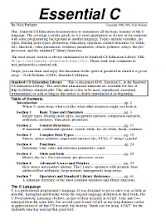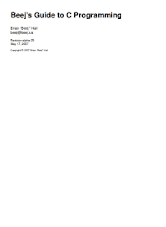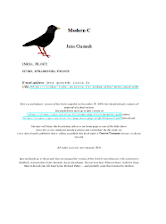Last Updated on June 3, 2025
10. Essential C by Nick Parlante
 This Stanford CS Education is a fairly brief document which explains all the common features and techniques for C. The coverage is pretty quick, so it is targeted at a programmer with a background in another language.
This Stanford CS Education is a fairly brief document which explains all the common features and techniques for C. The coverage is pretty quick, so it is targeted at a programmer with a background in another language.
Topics include variables, int types, floating point types, promotion, truncation, operators, control structures (if, while, for), functions, value parameters, reference parameters, structs, pointers, arrays, the pre-processor, and the standard C library functions.
Table of Contents:
- Introduction.
- Basic Types and Operators.
- Control Structures.
- Complex Data Types.
- Functions.
- Odds and Ends.
- Advanced Arrays and Pointers.
- Operators and Standard Library Reference.
The author’s description indicates this book is issued under an open-source like license.
11. Beej’s Guide to C Programming by Brian “Beej” Hall
 Beej’s Guide to C Programming tries to lead the reader from complete and utter sheer lost confusion on to the sort of enlightened bliss that can only be obtained though pure C programming.
Beej’s Guide to C Programming tries to lead the reader from complete and utter sheer lost confusion on to the sort of enlightened bliss that can only be obtained though pure C programming.
Chapters:
- Programming Building Blocks.
- Variables, Expressions, and Statements – A variable is simply a name for a number. An expression in C consists of other expressions optionally put together with operators. Examines the if, while, do-while, and the for statements.
- Building Blocks Revisited.
- Functions – put some of those building blocks in their own functions when they become too large, or when they do a different thing than the rest of the code.
- Variables, the Sequel – talks about variable scope and storage classes.
- Pointers – they are the address of data. Just like an int can be 12, a pointer can be the address of data.
- Structures – a construct that allows you to logically group variables into groups. You can then reference the group as a whole.
- Arrays – a linear collection of related data.
- Strings – a string in C is a sequence of bytes in memory that usually contains a bunch of letters.
- Dynamic Memory – explores the malloc(), free(), realloc(), and calloc() functions.
- More Stuff – topics include pointer arithmetic, typedef, enum, struct declarations, command line arguments, multidimensional arrays, casting and promotion, incomplete types, void pointers, NULL pointers, and static keywords.
- Standard I/O Library – used for reading from and writing to files.
- String Manipulation – find functions for pulling substrings out of strings, concatenating strings together, getting the length of a string, and more.
- Mathematics – functions that will serve your general purpose mathematical needs.
This book is licensed under the Creative Commons Attribution-Noncommercial- No Derivative Works 3.0 License.
12. Modern C by Jens Gustedt
 Modern C seeks to motivate the reader to climb to higher levels of knowledge.
Modern C seeks to motivate the reader to climb to higher levels of knowledge.
It is organized in chapters called “Levels” that summarize levels of familiarity with the C language and programming in general. Some features of the language are presented in parts on earlier levels, and elaborated in later one
The book is divided into five levels.
- First level – provides the reader with the very basics of C programs, their purpose, their structure, and how to use them.
- Second level – details most principal concepts and features such as control structures, data types, operators and functions. It aims to provide the reader with a deeper understanding of the things that are going on with running programs.
- Third level – goes to the heart of the C language. It fully explains pointers, familiarizes you with C’s memory model, and allows you to understand most of C’s library interface.
- Fourth level – goes into detail in specific topics, such as performance, reentrancy, atomicity, threads and type generic programming.
- Fifth level – discusses the author’s ideas for a future development of C.
This work is licensed under a Creative Commons “Attribution-NonCommercial-NoDerivatives 4.0 International” license.
Next page: Page 5 – Beej’s Guide to Network Programming and more books
Pages in this article:
Page 1 – The C Book and more books
Page 2 – An Introduction to C & GUI Programming and more books
Page 3 – The GNU C Reference Manual and more books
Page 4 – Essential C and more books
Page 5 – Beej’s Guide to Network Programming and more books
All books in this series:
| Free Programming Books | |
|---|---|
| Ada | ALGOL-like programming language, extended from Pascal and other languages |
| Agda | Dependently typed functional language based on intuitionistic Type Theory |
| Arduino | Inexpensive, flexible, open source microcontroller platform |
| Assembly | As close to writing machine code without writing in pure hexadecimal |
| Awk | Versatile language designed for pattern scanning and processing language |
| Bash | Shell and command language; popular both as a shell and a scripting language |
| BASIC | Beginner’s All-purpose Symbolic Instruction Code |
| C | General-purpose, procedural, portable, high-level language |
| C++ | General-purpose, portable, free-form, multi-paradigm language |
| C# | Combines the power and flexibility of C++ with the simplicity of Visual Basic |
| Clojure | Dialect of the Lisp programming language |
| ClojureScript | Compiler for Clojure that targets JavaScript |
| COBOL | Common Business-Oriented Language |
| CoffeeScript | Transcompiles into JavaScript inspired by Ruby, Python and Haskell |
| Coq | Dependently typed language similar to Agda, Idris, F* and others |
| Crystal | General-purpose, concurrent, multi-paradigm, object-oriented language |
| CSS | CSS (Cascading Style Sheets) specifies a web page’s appearance |
| D | General-purpose systems programming language with a C-like syntax |
| Dart | Client-optimized language for fast apps on multiple platforms |
| Dylan | Multi-paradigm language supporting functional and object-oriented coding |
| ECMAScript | Best known as the language embedded in web browsers |
| Eiffel | Object-oriented language designed by Bertrand Meyer |
| Elixir | Relatively new functional language running on the Erlang virtual machine |
| Erlang | General-purpose, concurrent, declarative, functional language |
| F# | Uses functional, imperative, and object-oriented programming methods |
| Factor | Dynamic stack-based programming language |
| Forth | Imperative stack-based programming language |
| Fortran | The first high-level language, using the first compiler |
| Go | Compiled, statically typed programming language |
| Groovy | Powerful, optionally typed and dynamic language |
| Haskell | Standardized, general-purpose, polymorphically, statically typed language |
| HTML | HyperText Markup Language |
| Icon | Wide variety of features for processing and presenting symbolic data |
| J | Array programming language based primarily on APL |
| Java | General-purpose, concurrent, class-based, object-oriented, high-level language |
| JavaScript | Interpreted, prototype-based, scripting language |
| Julia | High-level, high-performance language for technical computing |
| Kotlin | More modern version of Java |
| LabVIEW | Designed to enable domain experts to build power systems quickly |
| LaTeX | Professional document preparation system and document markup language |
| Lisp | Unique features - excellent to study programming constructs |
| Logo | Dialect of Lisp that features interactivity, modularity, extensibility |
| Lua | Designed as an embeddable scripting language |
| Markdown | Plain text formatting syntax designed to be easy-to-read and easy-to-write |
| Objective-C | Object-oriented language that adds Smalltalk-style messaging to C |
| OCaml | The main implementation of the Caml language |
| Pascal | Imperative and procedural language designed in the late 1960s |
| Perl | High-level, general-purpose, interpreted, scripting, dynamic language |
| PHP | PHP has been at the helm of the web for many years |
| PostScript | Interpreted, stack-based and Turing complete language |
| Prolog | A general purpose, declarative, logic programming language |
| PureScript | Small strongly, statically typed language compiling to JavaScript |
| Python | General-purpose, structured, powerful language |
| QML | Hierarchical declarative language for user interface layout - JSON-like syntax |
| R | De facto standard among statisticians and data analysts |
| Racket | General-purpose, object-oriented, multi-paradigm, functional language |
| Raku | Member of the Perl family of programming languages |
| Ruby | General purpose, scripting, structured, flexible, fully object-oriented language |
| Rust | Ideal for systems, embedded, and other performance critical code |
| Scala | Modern, object-functional, multi-paradigm, Java-based language |
| Scheme | A general-purpose, functional language descended from Lisp and Algol |
| Scratch | Visual programming language designed for 8-16 year-old children |
| SQL | Access and manipulate data held in a relational database management system |
| Standard ML | General-purpose functional language characterized as "Lisp with types" |
| Swift | Powerful and intuitive general-purpose programming language |
| Tcl | Dynamic language based on concepts of Lisp, C, and Unix shells |
| TeX | Markup and programming language - create professional quality typeset text |
| TypeScript | Strict syntactical superset of JavaScript adding optional static typing |
| Vala | Object-oriented language, syntactically similar to C# |
| VHDL | Hardware description language used in electronic design automation |
| VimL | Powerful scripting language of the Vim editor |
| XML | Rules for defining semantic tags describing structure ad meaning |
